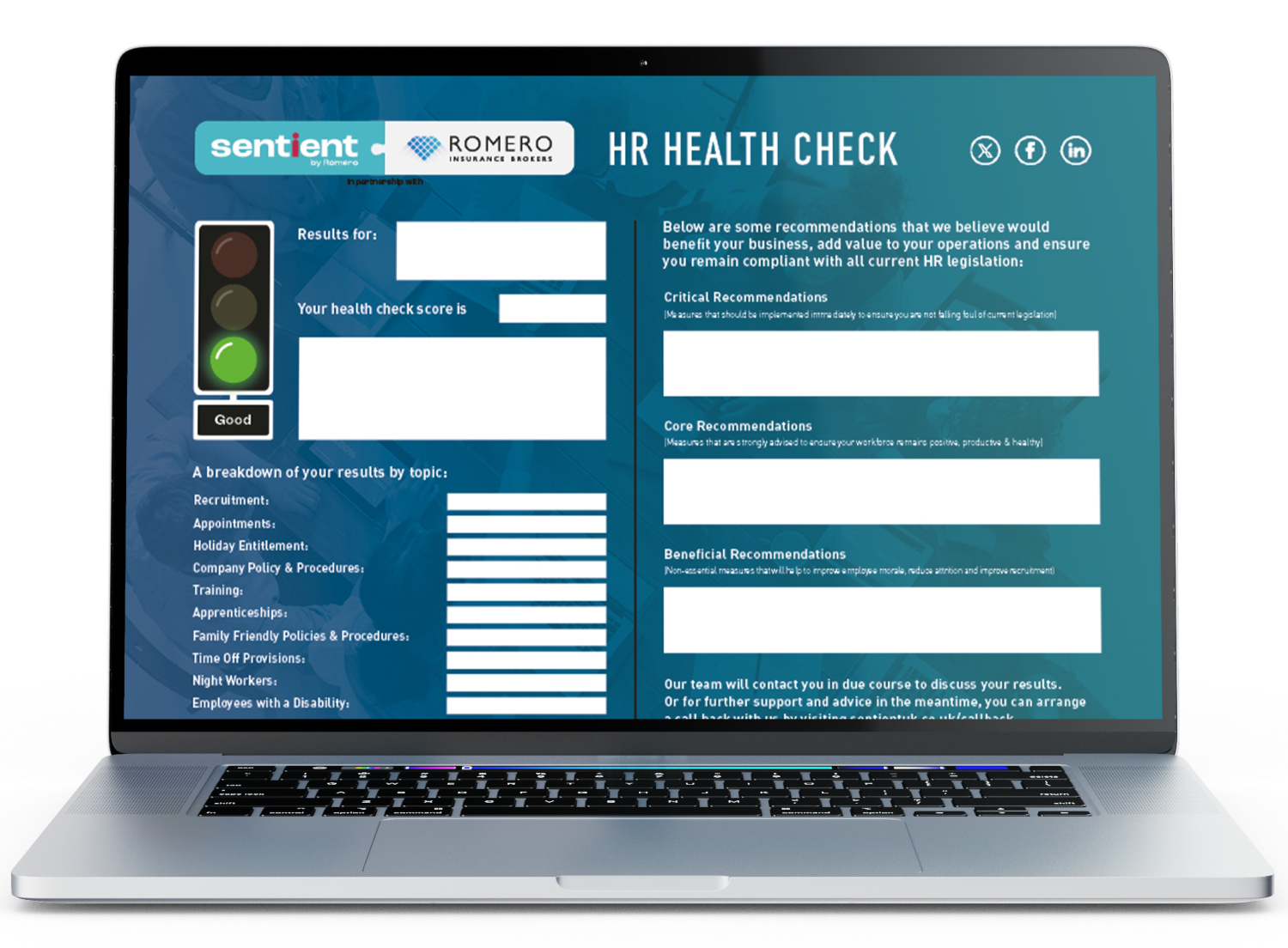Read our Employment Rights Bill Whitepaper for Businesses and Employers
Employers will be required to understand and implement the many changes introduced by the Employment Rights Bill. At Romero, we have refined and condensed the Government’s published information into a helpful whitepaper document. Read, download and print the document here:
What is the Employment Rights Bill?
A core part of the Labour Government’s manifesto is The Plan to Make Work Pay. The plan is designed to help support workers; their productivity and their work-life balance, as well as improve wages and living standards. A large function of this plan is the new Employment Rights Bill.
The Employment Rights Bill will address the treatment of workers and the obligations of employers. The Bill will address the flexibility of jobs, provide more job-security for workers and help to improve health and wellbeing. The Bill also is intended to modernise legislation and create fairer opportunities.
There are 9 key areas which will need to be addressed by employers. These span from parental leave to dismissal and redundancies. Employers need to understand their obligations and be careful not to unduly act in any way which could be observed as discriminatory.
Facts about the Employment Rights Bill
When will the Employment Rights Bill reforms be introduced?
The Employment Rights Bill was introduced into Parliament in October 2024, many of the changes are still being discuss and are yet to be passed; but are expected to be made into law in 2026 and 2027.
How many amendments will the Employment Rights Bill introduce?
There are 9 key areas which the Employment Rights Bill aims to change and modernise. These span from pregnancy and parental leave to dismissal and redundancies.
Why has the Employment Rights Bill been introduced now?
The bill is a key part of the Government’s Make Work Pay promise. It aims to ensure workers get fair pay for a fair day’s work. The legislation is designed to benefit the lowest paid and most vulnerable workers in our society, including those on zero-hour contracts and new to their roles.
What are the key qualities of the Employment Rights Bill?
The Employment Rights Bill should improve the security of workers while also enabling employers to ensure employees are right for the job through changes to probation periods. Many day one-rights will be enforced, ensuring a fair playing field for all workers. Flexibility is a key focus of the bill, benefiting equality and the wellbeing of workers, alongside a predicted knock-on effect on productivity.
When will employers be required to make changes to their practices in order to remain compliant?
After the Bill receives Royal Ascent, employers will be required to be compliant. As most reforms will take time and not take effect earlier than 2027, employers should look at adopting new procedures and transitioning. Relevant guidance will be published, but employers should look for immediate advice on policy wording and updated dismissal procedures.

The 9 most important changes introduced by the Employment Rights Bill
Zero hour contracts will see a swathe of changes to help improve the security and predictability of job for workers. The government effectively wants to end zero hour contracts which they see as exploitative and inflexible. This change is predicted to be enforced in 2027, so employer have time to restructure and adjust their worker’s contacts.
Obligations around dismissal and compensation has come under significant scrutiny. Security at work should not be a luxury for a privileged few, but should be a right for all workers. Yet business should be aware the amendment also makes dismissals easier, especially during the early months of employment. The change includes the two year qualifying period being abolished, and employees will be eligible to claim for unfair dismissal from the first day of work.
3. Third Party Harassment Liability
A large change which employers must understand involves the raised standards for preventing third party liability. Employers have a duty to take reasonable steps to best prevent against the harassment of employees. The bill also includes mention of protected characteristics; meaning not only sexual harassment, but racial, cultural, religious and disability would need to be catered against.
4. Protection against redundancy for pregnant women
included improved protections for new mothers and pregnant women against redundancy dismissals. These protections apply for the full pregnancy period, including time spent on Maternity Leave and a return-to-work period post-pregnancy. A dismissal during this period because of a pregnancy is automatically unfair, and these women should be prioritised over other employees at risk of redundancy.
One important change employers need to grasp is the alteration to Statutory Sick Pay (SSP). Day one employees and lower earners will see improved support. The amendments will also introduce a rebate scheme for the reimbursement of SSP costs for some companies.
6. Flexible Working Arrangement
Reasonable and fair requests concerning flexible working arrangements should be accepted by employers from now on. By introducing a more well-defined legal framework for flexible working, the intention is that this form of employment becomes more popular and is more likely.
7. Fire and Rehire Legislation Changes
By amending the law on unfair dismissal, fire and rehire practices will be restricted. A key change is that businesses must evidence why they are dismissing an employee, and therefore prove financial difficulties were a factor if they want to rehire employees on different terms.
8. Collective Redundancy Employer Obligations
The change will enforce the right to a redundancy consultation. The bill will improve transparentness between employers and employees; mandating clear communication between the two parties.
9. Bereavement and Parental Leave Rights
Employers will need to understand the specific changes to employee rights in relation to bereavement, paternity leave and unpaid parental leave. By removing restrictions on when employees have earned the right to take leave, flexibility and wellbeing should improve.

To avoid falling foul of these new regulations and obligations, businesses need to have a clear and informed policy in place. Without a successful policy, employers risk inconsistencies, discrimination, reputational damage and an unproductive demoralised workforce.
Why businesses should take a HR Health Check
HR can be complex, particularly as your employee numbers grow. Employment Law is a constantly evolving landscape, and the obligations that arise from new legislation need to be properly understood. With a plethora of legislation, guidance and requirements, there are a lot of elements to take into consideration, and numerous areas in which your HR team could fall down and make an inadvertent mistake.
At the heart of a successful business, is a robust Human Resources strategy. HR teams need to understand employment law updates and implement actions correctly, or appoint a trusted HR adviser to do it for them.
Sentient’s HR Health Check will help benchmark what your business is doing well, and where you could make improvements. The results of a HR Health Check from Sentient will include recommendations to help improve your business’s productivity and protection against employment risks.
How to arrange a Senitent Health Check?
Contact us to take the HR health check. Our partners at Sentient will come back to you within 5 working days with a detailed overview of how you can improve your HR function and support your team.
This free health check will grade your current practices with a traffic light system, showing how robust your HR procedures are. Sentient will provide recommendations graded from ‘nice-to-have’ suggestions which could help you improve morale and productivity, through to critical changes which could help protect you from prosecution.
Sentient provide HR and Employment Law services for corporations and small businesses. Sentient conducts reviews and workplace assessments to safeguard businesses, as well as providing staff training toward certifications.
Sentient is here for any business of any size who want to update their policies and procedures in time for Employment Law regulation changes. Contact Sentient today to begin a comprehensive review of your HR policies or take the HR Health Check.



